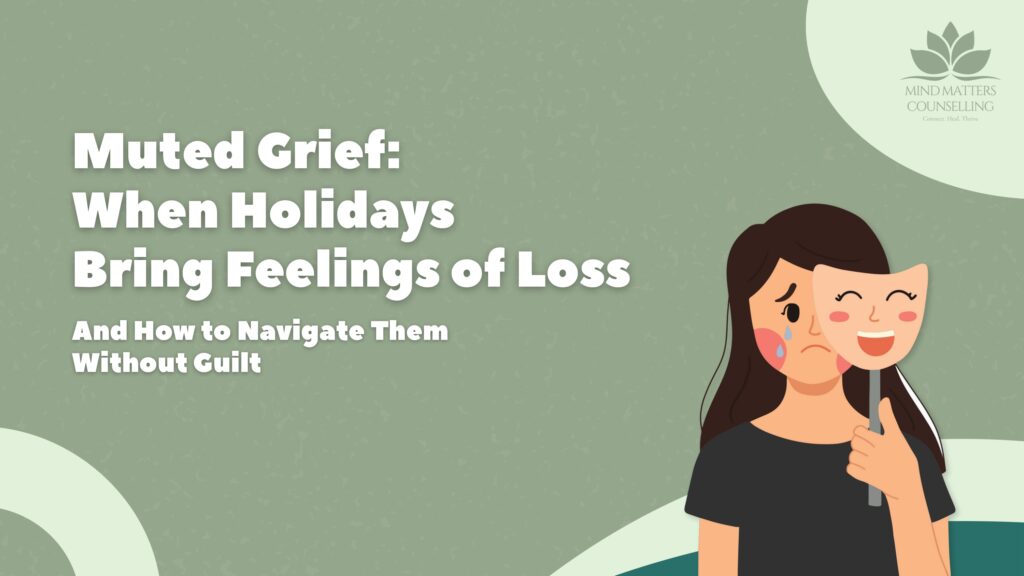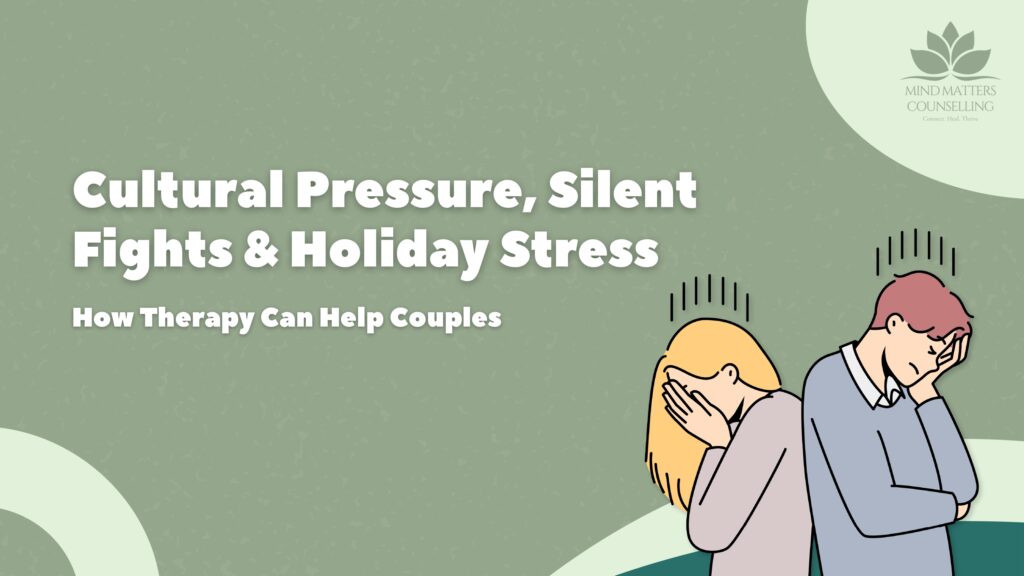“I’m getting married next year and I want my fiancé to attend couples therapy. There’s a lot I want to share with him about how nervous I am to live with his parents, but I don’t know how to say it. I’m also moving provinces and leaving behind my friends and family. I don’t think he understands what that really means.”
So many women I work with carry this story. We celebrate love and marriage—but underneath the lehenga fittings, RSVP lists, and makeup artists, there’s heaviness. Many of them experience it as grief, anxiety, and a deep sense of disorientation.
Let’s talk about it.
The Transition : Love
Getting Rokha’d and experiencing that fairytale proposal is supposed to be full of joy and happiness. But for many South Asian women, along with that happiness it also marks the start of a huge internal shift—one we’re rarely encouraged to talk about.
You’re gaining a partner but it also means loss of your personal space, your emotional ecosystem, and the version of yourself you’ve come to know and love.
Our families don’t often make space for these layered feelings. If you speak up, you are viewed as ungrateful or difficult. So instead, many of us swallow our fears and hope they’ll sort themselves out. They don’t.
OR
If you even gather the courage to talk, oftentimes you are told that as a woman you would have to ADJUST and COMPROMISE to keep the relationship fine. Hence, love and happiness undergo a big transition that brings you anxiety.
The Expectation : Multigenerational Living
During my marriage counselling sessions, I’ve sat across from women in therapy who feel like guests in their own homes(In Laws home). They tiptoe around the kitchen, feel the constant pressure to please, and carry guilt for even needing alone time.
Living with in-laws is seen as a part of getting married to your loved one in many South Asian families. And while it can be beautiful— it can also bring shared responsibility, the weight of new relationships, and intergenerational care which comes with its own emotional costs.
What makes it harder is that so many women don’t know how to bring these feelings up with their partner. How do you say, “I love you and want to stay with you, but I’m scared of living with your family in their home ?
You can love and respect your in-laws dearly and feel nervous about living with them. Both can be true. But no one teaches us how to hold both truths—especially before the wedding even happens.
Grieving the Move No One Talks About
When you’re moving provinces after marriage, the loss is more than logistical. You’re leaving behind your village—your childhood friends, your favourite coffee spots, your gym routines, your close by grocery store, basically your whole identity.
It’s a slow grief that doesn’t get much validation, especially when you’re supposed to be celebrating. People say things like “It’s part of life” or “You’ll adjust”—but rarely does anyone ask, “How are you feeling about this?”
Understanding the two major feelings, grief and excitement can co-exist together, and how one may overpower the other depending on the situation during the wedding planning and afterwards.
Loneliness after relocation is real. And if your partner has always lived in that city, or will be surrounded by his family and friends, the imbalance can feel even heavier.
How to Talk to Your Partner Without Feeling anxious

Understanding that growing up many of us have been conditioned into valuing harmony over honesty. We are asked to adjust, not rock the boat and go with the flow. We are forced into being subservient and not making others uncomfortable.
Hence, we never learnt to have tough conversations. Quite literally, being honest doesn’t have to be so conflicting. You can be honest and still be loving.
If you’re unsure how to talk about all this with your fiancé, here’s something I often share with my relationship counselling clients:
- Start with your heart, not your fears. You are the one that knows your partner the best. Find the right time where you both are grounded not when you’re distracted or rushing between tasks, but in a calm moment where connection feels possible. Start by creating space for the conversation— Maybe during a walk, or over a quiet dinner.
Try something like:
- “There’s something on my mind that’s been feeling heavy, and I’d love to share it with you. I’ve been excited for our life together—and also nervous ”
When you speak, try to lead with vulnerability rather than frustration. Use “I” language to anchor your feelings in your own experience, rather than making it about what he’s doing wrong. For example:
- “I’ve been feeling overwhelmed about all the upcoming changes—moving away, living with your parents, starting our new life. There’s so much I haven’t said out loud because I didn’t want to seem ungrateful or ruin the mood. But the truth is, I’m carrying a lot right now.”
Neither you’re not asking for a solution nor you’re blaming him—you’re inviting him into your inner world.
If you’re scared of how he’ll respond, name that too:
- “It’s actually really hard for me to talk about this. I’m worried it’ll come off the wrong way, but I really just want us to understand each other better.”
And when it comes to bringing up couples therapy, you might say:
- “Would you be open to us doing a few sessions together before the wedding? Not because anything’s wrong, but because there’s so much change ahead. I want us to build the tools now to handle whatever comes up later.”
If his first reaction is confusion, resistance, or defensiveness—that’s okay. You’re asking him to hear something new. Sometimes people just need a moment to adjust. What matters is staying connected to your intention—to create emotional intimacy, not emotional distance.
Therapy isn’t about fixing something broken—it’s about strengthening what’s already there.
What to Say About Couples Therapy
Couples therapy is often viewed as a punishment or as a major problem within the South Asian Diaspora. Bringing up couples therapy can feel intimidating, especially if your partner has never done it before. But the way you frame it can make a huge difference.
Instead of saying “We need relationship therapy,” which can feel heavy or alarming, try language that focuses on growth:
- I’ve been thinking about how much change we’re both about to go through. I love our relationship and our bond but I would also like to talk about a few things that might change within us with this new dynamic.”“Would you be open to trying a few premarital sessions together?
You can also share what you hope to gain from it:
- “For me, relationship therapy isn’t about fixing anything—it’s about creating a space where we can learn how to support each other better, especially with everything shifting around us. I think it could help us build more understanding before the wedding, not after.”
If he’s unsure, remind him this isn’t forever. Suggest a trial:
- “We could try just two or three couples therapy sessions and see how it feels. Even if nothing feels ‘wrong,’ I think it’s powerful to build those skills early on—before resentment builds or miscommunication happens.”
You might even say:
- “I want to feel like we’re walking into marriage together—not me carrying my fears alone and hoping they’ll pass.”
You’re Allowed to Want More Than a Happy Wedding
Here’s what I want every South Asian woman to hear: You are not difficult for wanting support. You are not selfish for grieving what you’re leaving behind. You are not weak for needing help navigating change. Letting your happiness co-exist alongside the sadness is what marriage might look like.
You are entering a new chapter—and it’s okay if it feels tender, scary, or uncertain. What matters is not hiding that part of yourself. What matters is giving yourself the language, the space, and the support to bring it forward. If you’re navigating challenges or transitions in your relationship, speaking with a marriage counsellor can help you find clarity and connection. Marriage is about building a life together—but that life should include you, fully.







